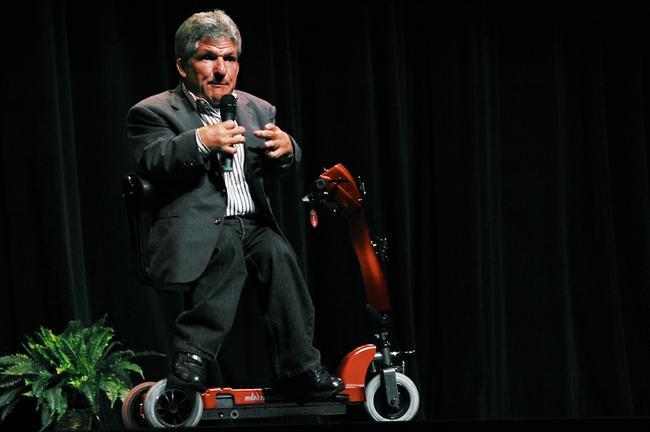
An aura of positivity filled the air in Jesse Auditorium as Matt Roloff received a standing ovation from MU students and members of the Columbia community.
Roloff, known publicly for his role on TLC’s “Little People, Big World,” visited MU on Tuesday to speak to students as part of the third annual Celebrate Ability Week. The Speakers Committee, a sub-branch of the Department of Student Activities, sponsored the event. According to DSA junior chairman Cale Sears, more than 500 people came out to hear Roloff’s presentation.
A self-proclaimed “continual advocate for dwarfism,” Roloff discussed the struggles and triumphs he has experienced as well as lessons he wants to share with others.
“Think about crafting your thoughts to be who you want to be,” Roloff said. “Take (the mindset) from reactive to make it proactive.”
This idea of proactivity inspired Roloff to take charge of his life, despite the challenges of living with dwarfism. One particular stay in the hospital as a child sparked Roloff’s determination to advocate for himself.
He had spent days working to solve a block-piece Superman puzzle while waiting for his grandmother to visit. When a nurse came in that Sunday morning, she jostled the puzzle, making all of the pieces fall out of order. Frustrated and annoyed, but not entirely discouraged, Roloff continued to solve the puzzle again, finishing the second time just before his grandmother returned.
“It was the first time I remember having the thought in my head that I’m going to have control in my life,” he said. “I got the puzzle done again. I remember the sense of empowerment.”
After that, Roloff began to advocate for himself, as well as those around him. He helped convince the hospital staff to turn an old storage room into a game room for the patients.
“That felt like a success,” Roloff said of his persuasive argument.
Afterward, he continued to look for ways to improve his situation, both at the hospital and at home. He built an underground fort in his backyard and made a motorized go-kart to improve efficiency for his paper route.
“I was constantly trying to innovate and look for solutions,” Roloff said. “I was always building stuff. I became sort of that guy that knew how to put things together.”
His “can do” attitude shines through into his message for other people, both those with and without disabilities. Roloff said resiliency would help people get past their roadblocks.
“There are all kinds of reasons to let your thoughts spiral you into a bad place. Stop. Reverse,” Roloff said. “Practice and stretch your muscle of resiliency. You can’t always take the easy road because then it doesn’t build your resiliency.”
Roloff’s send-off message was for people to take charge of their own behavior.
“Craft your thoughts, because they become your words,” he said. “Craft your words, because they become your actions. Craft your actions, because they become your habits. Craft your habits, because they become your character. Craft your character, because it becomes your destiny.”
Several members of the audience commented after the presentation that these words would stick with them.
John Monroe, a graduate student at MU studying special education, said he has seen “Little People, Big World” on television, and he enjoyed hearing the perspective of someone who lives with a disability.
“I love the thing he said about crafting character,” Monroe said. “You have to deal with the hand you’re dealt, and make the best of it. You have choices, and regardless of who you are, you can choose how you look at life.”
Freshman Eugenia Nathan said Roloff’s presentation opened her mind to a new, optimistic perspective.
“I came because I saw his show and I thought it would be cool to see him in person,” Nathan said. “He was a lot more open than I thought he would be. He didn’t mind tackling the awkward questions that people were asking, like about (his wife’s) pregnancy and derogatory terms.”
Roloff took questions from the audience following his speech, addressing topics ranging from his family’s show on TLC to dwarfism advocacy and educational programs. He stressed advocacy, resiliency and encouragement as the most important aspects of overcoming adversity.
“There were lots of things to be negative about,” he said. “But I never felt sorry for myself. Advocacy, just like resiliency, takes practice.”